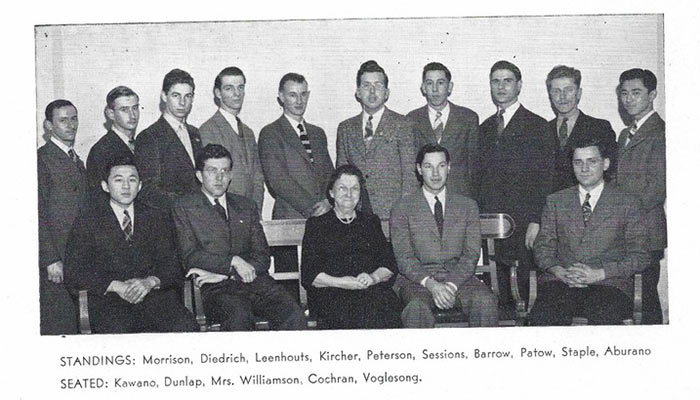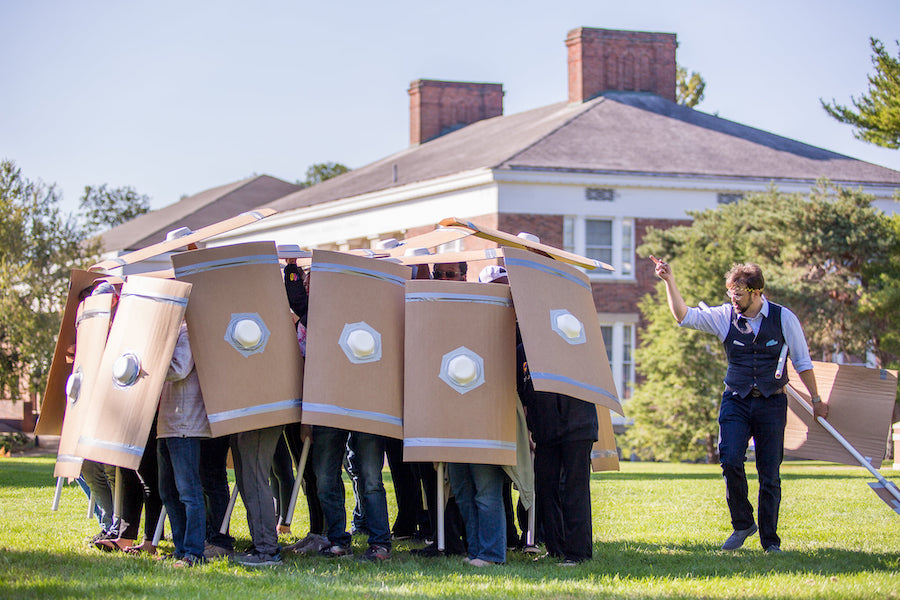Sanctuary Campus: Albion College and World War II
Related Programs
Related Posts
Connect With Us
Seventy-five years ago, Executive Order 9066 was issued; 11 months later, Albion welcomed two Japanese Americans to campus
February 21, 2017

Members of the Goodrich Club pictured in the 1944 Albionian. George Kawano, ’47, is seated far left; Fusajiro Aburano, ’48, is standing far right.
By Wesley Arden Dick, professor of history
Editor’s note: The following article includes quoted material from the historical period that contains a term which today is considered highly offensive.
When Japan bombed Pearl Harbor on December 7, 1941, America was plunged into World War II. The shocking Japanese attack reignited deep-seated anti-Asian and anti-Japanese prejudices. Amid the hysteria, on February 19, 1942, President Franklin Roosevelt issued Executive Order 9066, requiring all West Coast Japanese Americans to relocate to 10 internment camps spread across the United States interior. Some 120,000 men, women, children and elders were forced to leave their homes and property behind.
As the war continued, some Americans had twinges of conscience about relocation and internment. A committee was formed to expedite the exodus of college-age Japanese Americans “From Concentration Camp to Campus.” On January 22, 1943, Albion College President John Seaton announced that the War Relocation Authority had approved the College as the host for two young Japanese American men starting with the second semester. Seaton added: “They will live at the Goodrich Club, which generously offered to open its doors to them.”
Not surprisingly, allowing Japanese Americans to attend college, while other Americans were being taken out of college to fight the Japanese, was controversial. In a letter to the editor of the Albion Evening Recorder concerning “The Japanese Students,” “A Mother” called into question President Seaton’s decision:
“There is many an American boy over there in the Pacific who would rather be in college. Many Americans will give up school to fight Japs. Should we offer to educate an American-born Jap in the American boys’ place?
“I am wondering what some of our service men would think of Albion’s generosity. Perhaps it is wrong to have hatred for any people in our hearts, but would any mother approve of Japs in our city if she has a son in this war? Let us hope none of Hitler’s family decide to come to Albion College.”
The Albion Evening Recorder responded in an editorial entitled “The Coming of the American-Japanese Students.”
“As might be expected, the announcement that two American born men students, whose only ‘crime’ is they are of Japanese parentage, will be on the Albion College campus as students during the second semester has created something of a stir about the city during the past few days.
“To keep an attitude of hope for the future alive in the hearts of the young men and women of Japanese background, but thoroughly American in spirit except for their last names and skin, some must be given a chance to have an education. For when the travail of war is over it will be wise to have such persons free of bitterness.”
Goodrich Club student Lawrence Sharpe, class of 1943, also replied to the “Mother.” Sharpe, who had enlisted in the Naval Reserves right after Pearl Harbor, wrote:
“These boys are not Japanese, they are Americans, just as much as any German-American or Italian-American who is now attending and certainly we would not make any discrimination against them. Of the 26 [Goodrich] boys who cast their votes to accept these fellows, 19 of them are in some sort of reserve program and will see service themselves.
“I can readily appreciate ‘A Mother’s’ view, but in times like these we must not be ruled by emotions, but by common sense. We all have friends, and some of us brothers and sisters who are serving our country, and we know that today they are giving their all in order that there may be a better world. How can their dream be realized if we discriminate against our own kind?”
The two Albion College students, George Kawano and Fusajiro Aburano, started classes on February 1, 1943. They lived first at the Goodrich Club and then at Tau Kappa Epsilon (TKE). They participated in Albion College athletics, academic clubs and honor societies.
Fusajiro Aburano’s life journey began in Sebastopol, California, on June 25, 1923. Growing up, he worked in his parents’ apple-dehydrating plant. Within months of his high school graduation, Executive Order 9066 was issued, and Aburano was relocated to the Granada (Colorado) Internment Camp. He put his Albion College education on hold to serve with General Douglas MacArthur’s U.S. Army 1st Cavalry Division in Japan. Aburano returned to Albion and received his B.A. in 1948 as part of the combined-course program with the University of Michigan, where he completed his electrical engineering degree in 1949. He became known as Paul Fusajiro Aburano, moved to Seattle, married Sharon Tanagi, and retired from Boeing after a 35-year career. He died in 2014.
George Kawano was born on February 22, 1924 in Tacoma, Washington, where he graduated from Stadium High School. When 9066 was issued, Kawano was sent to the Tule Lake Internment Camp in northern California. Kawano’s Albion College education, directed toward engineering, was also interrupted by a tour of duty in the U.S. Army. He returned to the College in 1946 and received his B.A. in 1947. That same year, he received a fellowship for graduate study at the University of Michigan. Kawano was living in Audubon, New Jersey, when he died on July 4, 2000. He is buried in the Beverly National Cemetery in New Jersey.
America belatedly has had regrets about Order 9066, and its “guilt by association” policies. In 1976, in repealing 9066, President Gerald Ford said: “We all know now what we should have known then—not only was that evacuation wrong, but Japanese Americans were and are loyal Americans.” In 1988, President Ronald Reagan signed a law that granted reparations to living survivors of the internment camps. Reagan also issued a national apology.
We commemorate the 75th anniversary of 9066 at a time when America is once again witnessing xenophobia, nativism and anti-immigration sentiments regarding “the other.” In the contemporary debate, the internment of Japanese Americans is often brought up as a cautionary tale. During World War II, Albion and Albion College proved to be a sanctuary for George Kawano and Fusajiro Aburano. Albion and Albion College opened their hearts to “the other.” It is a proud legacy with relevance for today.
